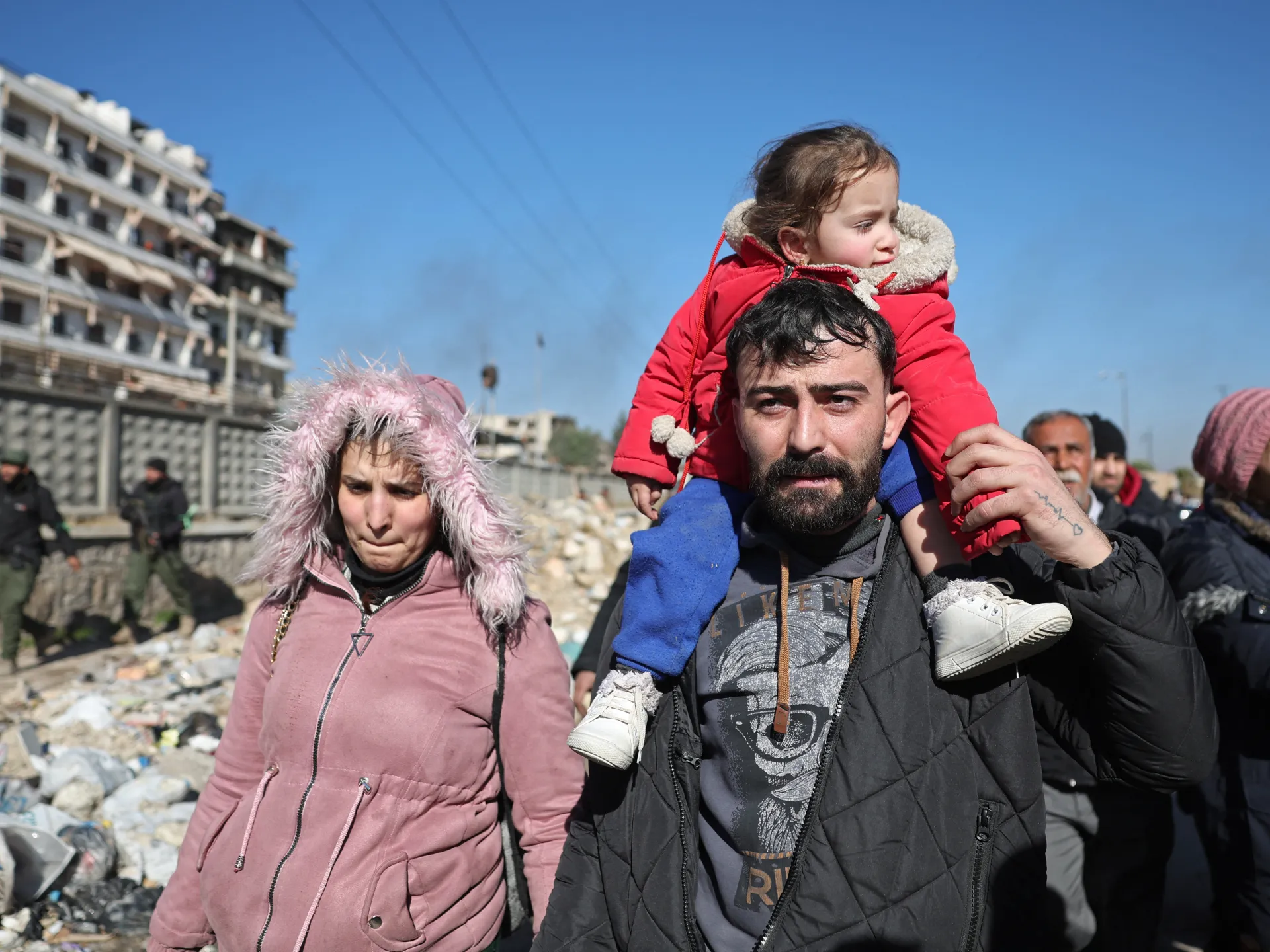Relative calm in Syria’s Aleppo as Kurdish fighters disarm | Syria’s War News
The Syrian government says its forces have reasserted control over violence-hit neighbourhoods in Aleppo after dozens of fighters with the Kurdish-led Syrian Democratic Forces (SDF) laid down their arms after days of intense fighting.
Syria’s Ministry of Interior spokesman, Nour al-Din al-Baba, said on Saturday that government forces had taken near-complete control of Aleppo’s Sheikh Maqsoud and Ashrafieh areas, adding that operations were nearing their “final moments”.
Recommended Stories
list of 4 itemsend of list
“The Sheikh Maqsoud neighbourhood has almost been completely captured,” al-Baba told the Syrian News Channel.
Fighting flared up on Tuesday in the predominantly Kurdish neighbourhoods of Sheikh Maqsoud, Ashrafieh and Bani Zaid after Syrian forces and the SDF failed to implement a March 2025 agreement to reintegrate the Kurdish forces into state institutions.
Tensions spiked after the deadline for the deal passed at the end of last year, with the Kurdish fighters refusing to leave areas of Aleppo that have been under SDF control since the early days of the Syrian war, which erupted in 2011.
On Saturday, dozens of fighters surrendered and were taken on buses to SDF-controlled areas in the country’s northeast, Al Jazeera’s Resul Serdar Atas reported from Aleppo.
“Compared with what we have seen over the last three days, it is quiet in Aleppo,” he said.
Calm was restored after a brief escalation earlier in the day, which saw a drone attack believed to have been launched by the SDF hit a governorate building during a news conference attended by several high-ranking Syrian officials.
Serdar Atas said Governor Azzam al-Gharib had been delivering a news briefing on the latest developments when the blast took place, blackening the upper floors of the building.
The SDF denied the reports, saying its fighters did not attack a civilian target.
In a statement carried by the SANA state news agency, Syria’s army said the Kurdish-led force fired more than 10 drones in Aleppo, causing numerous injuries and extensive property damage. It accused the group of using Iranian-made drones.
Serdar Atas said that Syrian forces were sweeping the city’s neighbourhoods for explosives and mines.
“However, the government says there are still some SDF factions that are fighting back and refusing to lay down their arms and surrender,” he said.
Reintegration stalled
The clashes in Aleppo – which the city’s Health Directorate said have killed 23 people, including civilians, and wounded 104 others – have marked the fiercest fighting since longtime Syrian leader Bashar al-Assad’s fall in December 2024.
They have also underscored the major challenges facing Syria’s new president, Ahmed al-Sharaa, who has pledged to unite the country following al-Assad’s removal.
Steven Heydemann, a professor of Middle East studies at Smith College in the United States, told Al Jazeera that the presence of SDF forces in Aleppo neighbourhoods had been a “source of friction” with the central government in Damascus.
Since the March 2025 integration deal was signed, Kurdish leaders have expressed concerns over security guarantees and political representation, while Damascus has pushed to reassert control over all remaining autonomous areas.
“Aleppo is Syria’s largest city, the linchpin of northwestern Syria’s commercial, political and industrial life,” Heydemann told Al Jazeera.
“So to have enclaves in Aleppo outside the control of the central government was always going to be very difficult for the government to swallow.”
On Friday, the Syrian Ministry of Defence gave Kurdish fighters a six-hour window to withdraw from Aleppo to their semi-autonomous region in the northeast of the country as part of a ceasefire.
But Kurdish councils that run the city’s Sheikh Maqsoud and Ashrafieh districts rejected any “surrender”.
Government forces then entered Sheikh Maqsoud on Saturday and carried out sweeps of the neighbourhood, confiscating weapons and detaining or disarming SDF fighters, according to Syrian officials.
Thousands displaced
Nearly 180,000 people have been displaced from the Sheikh Maqsoud and Ashrafieh areas due to this week’s fighting, with authorities warning them not to return due to ongoing operations and the risk posed by unexploded ordnance.
Meanwhile, both sides have continued to trade accusations of attacks on civilians and civilian infrastructure.
Tom Barrack, the US special envoy for Syria, on Saturday urged “all parties to exercise maximum restraint, immediately cease hostilities, and return to dialogue” after a meeting with al-Sharaa and Minister of Foreign Affairs Asaad al-Shaibani.
Barrack added that US Secretary of State Marco Rubio’s team was ready to facilitate engagement between the two sides to advance the integration process.
Reporting from Damascus, Al Jazeera’s Ayman Oghanna said that Washington can “do the most” to boost talks between the Syrian government and the SDF.
“The US has enjoyed a strong relationship with the SDF for over a decade. The US helped build up and train the SDF, it fought alongside the SDF, and 1,000 US troops remain in SDF territory, where they work closely together in the effort to eradicate ISIL (ISIS) from Syria,” Oghanna said.
“But the US has also recently strengthened its ties with Damascus,” he added.
The United Nations also voiced alarm over the fighting, warning of the humanitarian consequences and calling on all sides to respect international law and ensure civilian protection.
